 Petzlover
Petzlover Flat-Coated Retriever is originated from United Kingdom but Lhasapoo is originated from United States. Flat-Coated Retriever may grow 33 cm / 13 inches higher than Lhasapoo. Flat-Coated Retriever may weigh 30 kg / 67 pounds more than Lhasapoo. Flat-Coated Retriever may live 5 years less than Lhasapoo. Both Flat-Coated Retriever and Lhasapoo has almost same litter size. Both Flat-Coated Retriever and Lhasapoo requires Moderate Maintenance.
Flat-Coated Retriever is originated from United Kingdom but Lhasapoo is originated from United States. Flat-Coated Retriever may grow 33 cm / 13 inches higher than Lhasapoo. Flat-Coated Retriever may weigh 30 kg / 67 pounds more than Lhasapoo. Flat-Coated Retriever may live 5 years less than Lhasapoo. Both Flat-Coated Retriever and Lhasapoo has almost same litter size. Both Flat-Coated Retriever and Lhasapoo requires Moderate Maintenance.
 The Flat-Coated Retriever traces its heritage to 19th century England. A popular gamekeepers’ dog, the actual descendants of the breed are not entirely known. Like so many well-established breeds, there are many lines of thought about the breed line. There is an unverified line of ancestry that includes the St. Johns Water Dog – an extinct breed from North America. Another story has Canadian sailors bringing their Newfoundlands to England and mixing them with Colliers and Setters. This story has more truth to it and it took 20 years to establish the final breed type.
The Flat-Coated Retriever traces its heritage to 19th century England. A popular gamekeepers’ dog, the actual descendants of the breed are not entirely known. Like so many well-established breeds, there are many lines of thought about the breed line. There is an unverified line of ancestry that includes the St. Johns Water Dog – an extinct breed from North America. Another story has Canadian sailors bringing their Newfoundlands to England and mixing them with Colliers and Setters. This story has more truth to it and it took 20 years to establish the final breed type.
The breed was originally a retriever with two purposes – to retrieve the hunters’ bounty on land and on water.
The Flat-Coated Retriever was then introduced to the United States as a gun dog. By 1873 it was a “stable type” and in 1915 the AKC recognized the breed. After this, their popularity grew quickly until the American public fell in love with the Golden Retriever and the Labrador Retriever. Then the Flat-Coated Retriever’s numbers and popularity fell. The irony was that both the Golden and the Labrador credited the Flat-Coated Retriever as an ancestor. The survival of the breed was questionable following World War Two. They were brought back by a specific breeding program in the 1960’s.
Breeders in the ‘60s made sure they bred for both show dogs and companion animals. The Flat-Coated Retriever survived and is less popular than other retrievers, but he has his fans. The breed is more popular in the United Kingdom than it is in the United States in part because of Best in Show wins at Crufts
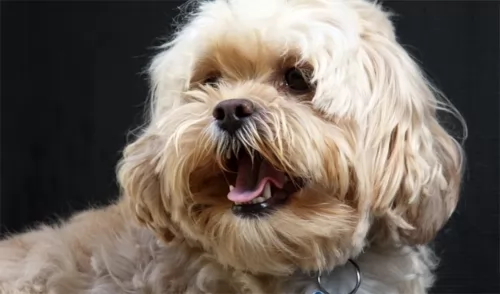 Such a cute, cuddly teddy bear of a dog is popular with everyone who just wants a wonderful canine companion.
Such a cute, cuddly teddy bear of a dog is popular with everyone who just wants a wonderful canine companion.
Both the Lhasa Apso and the Poodle are ancient dog breeds and they are the two breeds that have been used to bring about the Lhasapoo. The Poo has been bred to essentially be an indoor dog.
It would appear as though the Lhasapoo was developed in the United States of America, as in 1933, a pair was given to an American traveler who developed a kennel.
 The Flat-Coated Retriever has a straight and strong topline with unique head, strong jaws, a long muzzle and small ears. His eyes are dark brown almonds with a friendly and intelligent expression. He has an arched neck and a moderately long tail. The Flat-Coated Retriever is more of an athlete, lighter and certainly more elegant than any other type or breed of retriever.
The Flat-Coated Retriever has a straight and strong topline with unique head, strong jaws, a long muzzle and small ears. His eyes are dark brown almonds with a friendly and intelligent expression. He has an arched neck and a moderately long tail. The Flat-Coated Retriever is more of an athlete, lighter and certainly more elegant than any other type or breed of retriever.
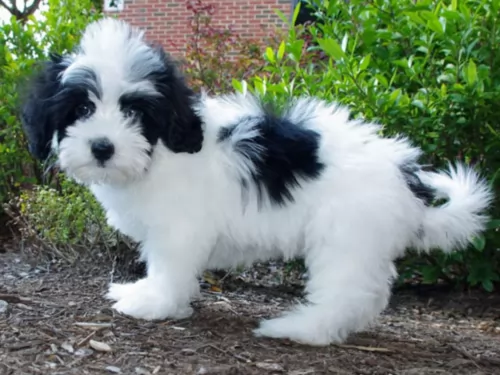 The Lhasapoo is a mix of Poodle and Lhasa Apso. He is a small dog standing between 25–28 cm in height and weighing 4 – 6kg.
The Lhasapoo is a mix of Poodle and Lhasa Apso. He is a small dog standing between 25–28 cm in height and weighing 4 – 6kg.
Known as a designer breed, his small size allows him to adapt to life in the city or to the countryside. He is such a cute little dog with his alert face, his bright brown eyes, short legs and floppy ears.
His coat is thick and dense and can be curly or fairly straight. It comes in a number of solid colors – apricot, tan, cream, brown, white and black or he can be bi-color – any of these colors mixed with white. In fact, as a crossbreed he can inherit the looks of either dogs – the Poodle or Lhasa Poo. Because he has poodle in him, these dogs are sometimes spoken about as being hypoallergenic.
Small and gentle in nature, the Lhasapoo makes a splendid pet and companion for everyone. He is such an amicable small dog, getting on well with both children and other pets in the home.
You can’t really tell what kind of a dog he’ll turn out to be in terms of his character, because he can be quite aloof if the Lhasa side of him is stronger or he could be playful and friendly if the Poodle side of him is stronger.
 The Flat-Coated Retriever is great with children. Just be careful they don’t knock over small children in their enthusiasm.
The Flat-Coated Retriever is great with children. Just be careful they don’t knock over small children in their enthusiasm.
They are confident great family dogs. They are “thinking dogs” and need something to work for or they will work for themselves. They can be clowns.
They are adaptable although their size might preclude small locations without yards.
Smart, thinking all the time, they are very trainable. However, they are considered the “Peter Pan” of dogs – they never grow up.
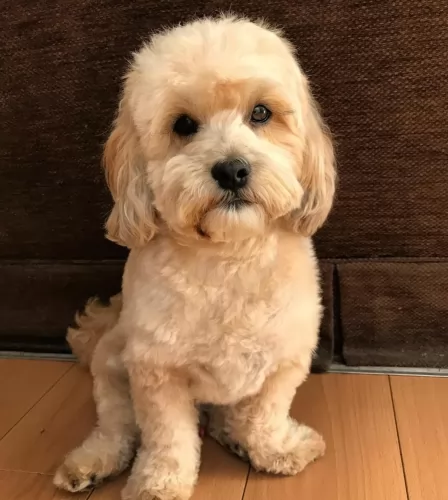 The Lhasapoo is a crossbreed, so you never know what you’re actually going to get – a little bit of Lhasa or a little bit of Poodle.
The Lhasapoo is a crossbreed, so you never know what you’re actually going to get – a little bit of Lhasa or a little bit of Poodle.
One thing is for sure though – you’re going to get the cutest little pet ever. He is a friendly, affectionate dog, but the Lhasa side of him makes him wary of strangers, making him an excellent watchdog.
They have a moderate activity levels and will adapt easily to life in the city or in the countryside, but they will need a walk every day to ensure he doesn’t become unfit and obese.
Lhasapoo puppies are adorable but every cute puppy grows into an adult. Then it’s time to show you’re a responsible dog owner by continuing to love and care for your adult Lhasapoo so that he becomes the wonderful companion he is designed to be.
 Flat-Coated Retrievers have their share of health concerns from dysplasia to cancer. The breeds problems include:
Flat-Coated Retrievers have their share of health concerns from dysplasia to cancer. The breeds problems include:
Hemangiosarcoma, Osteosarcoma, Malignant Histiocytosis, and Fibrosarcoma. Studies show that about half of all Flat-Coated Retrievers die of cancer.
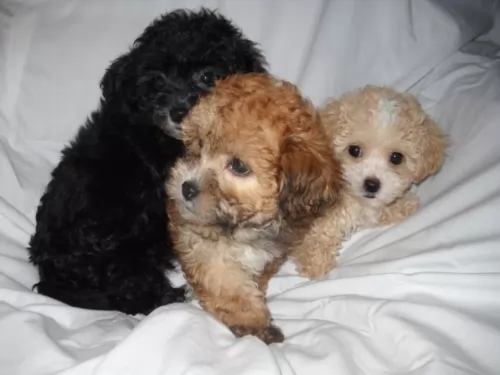 All dogs have the potential to become ill but when you give your dog the best chance to eat well and he is loved and cherished, he can live a long life.
All dogs have the potential to become ill but when you give your dog the best chance to eat well and he is loved and cherished, he can live a long life.
The Lhasapoo can live to be 15 years of age if you treat him well and ensure that he has a healthy diet. Of course as a crossbreed, his chances of developing inherited diseases is limited.
Watch out for Bloat, particularly if your pet gobbles up a large bowl of food. It is better to feed him 2 smaller meals a day. There are some time-releasing food bowls available for pets to encourage slower eating.
With Bloat, you’ll notice your pet’s stomach is swollen up. Complications set in when the stomach turns or twists as fluid and air can’t escape. Your dog will also be restless, drooling and trying to vomit. Bloat is a life-threatening illness.
This can be a complication from disease or medications even. It is important to keep your pet’s teeth healthy as chronic kidney disease can be caused by dental disease too. Bacteria from the diseased teeth and gums enters bloodstream and damages vital organs like the kidneys.
 He will be a medium size dog. Feed puppies 3-4 times a day about a 1/8 cup of high-quality food. Feed a puppy food designed for medium size dogs or specifically for retrievers.
He will be a medium size dog. Feed puppies 3-4 times a day about a 1/8 cup of high-quality food. Feed a puppy food designed for medium size dogs or specifically for retrievers.
Feed 2 times a day about !/2 cups of dry food per meal. Do not overfeed. They have a tendency to be obese.
Maintain a healthy weight and avoid exercise before and after meals. The good news is dysplasia and epilepsy are rare in the breed.
They are very energetic and need good exercise. Long walks and a yard to run in. Remember they are hunting dogs and will chase to retrieve things so don’t let them off leash outside your yard. They will excel at agility, tracking. Rally, obedience, swimming, hunting, and jogging. They make great therapy dogs.
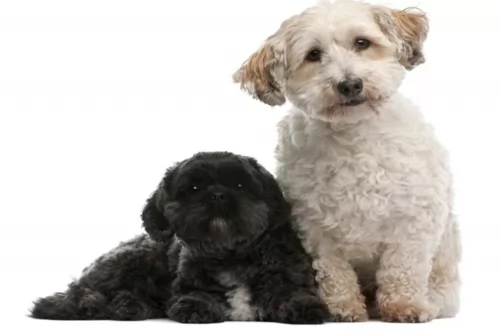 The Lhasapoo is a dog breed that likes to spend time indoors. Because of his looks, his human family members will no doubt be vying for his attention and playing indoor games with him. It will do him good to get out for a walk every day as this gives him the chance to sniff around and smell different things and experience life outside his home.
The Lhasapoo is a dog breed that likes to spend time indoors. Because of his looks, his human family members will no doubt be vying for his attention and playing indoor games with him. It will do him good to get out for a walk every day as this gives him the chance to sniff around and smell different things and experience life outside his home.
The Lhasapoo isn’t a big eater and he will require top quality food for small breeds. He isn’t a big meat eater so a tiny bit of cooked chicken, rice and vegetables chopped up nicely and added to his kibble from time to time will keep him healthy and happy.
Being the crossbreed that he is, you can’t be too sure about the type of coat your Lhasapoo will have. It can be curly, wavy or straight. Most inherit curls.
A Lhasapoo coat looks wonderful when it has been professionally groomed, and then in between grooming, his coat will need to be brushed to prevent tangling. While you’re brushing him, check his eyes too. Sometimes he can develop tear stains beneath the eyes and you can wipe gently around his eyes.
Other grooming for your cute little dog includes having his nails clipped as well as checking inside the ears for infection. Excess wax and dirt can result in an ear infection. You’ll notice your pet shaking his head, the insides of his ears might be red and he wants to scratch his ears. Get him to the vet who will show you how to keep his ears clean and dry.
Also, brush his teeth with special canine toothbrush and toothpaste. Dental disease won’t only damage his teeth, it can cause problems with other parts of the body too.